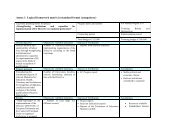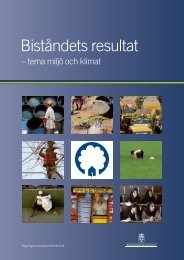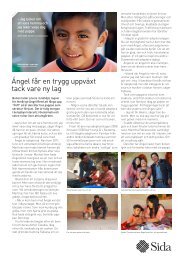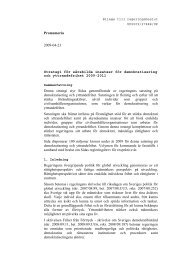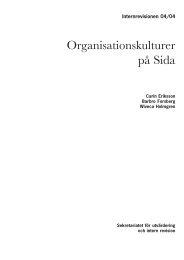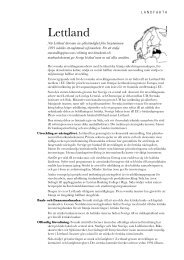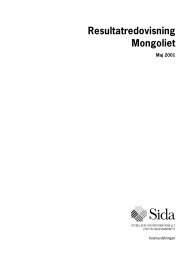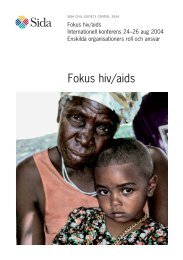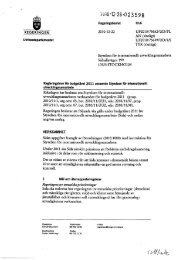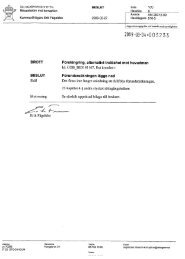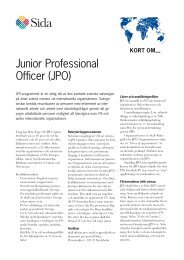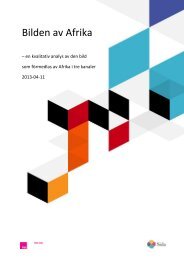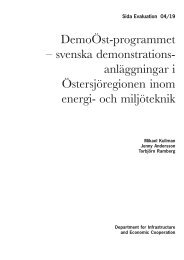Mid-Term Review of the AGIR Programme - Sida
Mid-Term Review of the AGIR Programme - Sida
Mid-Term Review of the AGIR Programme - Sida
You also want an ePaper? Increase the reach of your titles
YUMPU automatically turns print PDFs into web optimized ePapers that Google loves.
A N N E X 3 – I N C E P T I O N R E P O R T<br />
<strong>the</strong>se change pathways within <strong>the</strong> <strong>AGIR</strong> programme and will focus <strong>the</strong> analysis <strong>of</strong> <strong>the</strong><br />
support that is central to <strong>the</strong> work <strong>of</strong> capacity streng<strong>the</strong>ning <strong>of</strong> CSO partners.<br />
Evaluation Methodology<br />
The approach to <strong>the</strong> evaluation will require evidence collecting both in Maputo and in<br />
<strong>the</strong> provinces <strong>of</strong> Mozambique where many <strong>of</strong> <strong>the</strong> CSO partners work. The two main<br />
sources <strong>of</strong> evidence in this evaluation used will be <strong>the</strong> review <strong>of</strong> programme documentation<br />
at <strong>the</strong> donor, intermediary and CSO partner level and <strong>the</strong> use <strong>of</strong> information<br />
ga<strong>the</strong>red primarily through interviews with individuals at <strong>the</strong> donor, intermediary<br />
and CSO partner levels.<br />
An additional source <strong>of</strong> evidence will be through <strong>the</strong> interviewing <strong>of</strong> individuals or<br />
organisations not connected to <strong>the</strong> <strong>AGIR</strong> programme, but who work in or have<br />
knowledge <strong>of</strong> <strong>the</strong> context <strong>of</strong> <strong>AGIR</strong> within Mozambique. These ‘second opinions’, or<br />
external informants, are important for balancing <strong>the</strong> information collected through<br />
documents and interviews related to <strong>the</strong> <strong>AGIR</strong> programme and could play and important<br />
role in <strong>the</strong> triangulation <strong>of</strong> evidence. These sources can be:<br />
Donors not currently involved in <strong>the</strong> programme, government departments<br />
and/or agencies, and local CSOs. Donors with or without interest in joining<br />
<strong>the</strong> <strong>AGIR</strong> programme including Danida,<br />
O<strong>the</strong>r major civil society programmes including MASC, ‘Dialogo’ (DFIDfunded<br />
civil society program focusing on five municipalities)<br />
Commissions/working groups in <strong>the</strong> parliament.<br />
A primary step in <strong>the</strong> construction <strong>of</strong> this evaluative narrative is a review <strong>of</strong> <strong>the</strong> documentation<br />
produced by and/or associated with <strong>the</strong> <strong>AGIR</strong> programme. This process<br />
has already begun with documentation collected from <strong>Sida</strong> and all <strong>of</strong> <strong>the</strong> intermediaries.<br />
Interviews with <strong>the</strong> Swedish Embassy/<strong>Sida</strong> staff and o<strong>the</strong>r donors associated with<br />
<strong>the</strong> <strong>AGIR</strong> programme, as well as those individuals working within <strong>the</strong> INGOs involved<br />
in <strong>the</strong> programme, have also already begun. The focus <strong>of</strong> <strong>the</strong>se interviews,<br />
while preliminary at this inception stage, has been on unravelling <strong>the</strong> relationships<br />
between <strong>the</strong> intermediaries and <strong>the</strong>ir CSO partner organisations from <strong>the</strong> perspective<br />
<strong>of</strong> <strong>the</strong> intermediary.<br />
Perhaps <strong>the</strong> most critical part <strong>of</strong> <strong>the</strong> evaluation will be <strong>the</strong> information collected<br />
through semi-structured interviews with selected CSO partner organisations. Examining<br />
both <strong>the</strong> internal and external capacities <strong>of</strong> <strong>the</strong> CSO partner organisations and<br />
<strong>the</strong>ir work in <strong>the</strong> <strong>AGIR</strong> programme is crucial to understanding and assessing <strong>the</strong> progress<br />
made so far by <strong>the</strong> <strong>AGIR</strong> programme. Semi-structured interviews shall be carried<br />
out with a selection <strong>of</strong> 8 to 10 current <strong>AGIR</strong> partners. There is no intention to<br />
obtain a representative sample among <strong>the</strong> CSO organisations, which are all very different.<br />
Ra<strong>the</strong>r, <strong>the</strong> CSO partners will be selected so as to capture partner diversity,<br />
issue-based partner linkages, local, regional, national dimensions and special aspects<br />
such as gender or specific rights-based approaches. While <strong>the</strong> evaluation team will<br />
make <strong>the</strong> final selection <strong>of</strong> <strong>the</strong>se partner organisations, this selection will be informed<br />
through <strong>the</strong> current ongoing discussions with <strong>the</strong> intermediary organisations.<br />
101



